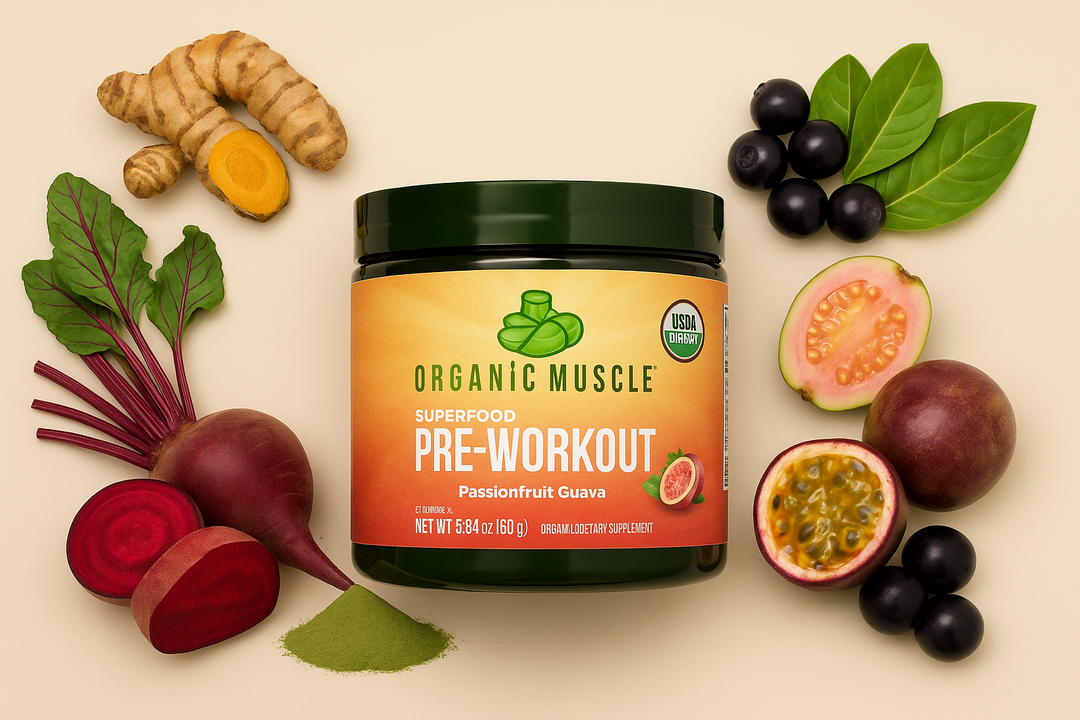Introduction to organic protein
Organic protein is a natural option for athletes looking to supplement their diet. It's derived from plants and contains essential amino acids for muscle recovery and growth. Unlike conventional protein powders, organic protein is free from synthetic chemicals, pesticides, and GMOs, making it a cleaner and healthier choice for your body. Organic protein also offers easy digestion and absorption, which can help you maximize your workout results.

Benefits of organic protein for athletes
Organic protein provides athletes with high-quality fuel for their muscles and overall performance. It offers numerous benefits such as:
- Faster muscle recovery after intense workouts
- Improved muscle strength and endurance
- Easier digestion and absorption compared to non-organic protein sources
-
Higher nutritional value due to fewer additives and pesticides
Athletes can incorporate organic protein into their diets through powders, bars, and shakes, allowing them to efficiently meet their nutritional needs and achieve their fitness goals.
Difference between organic and non-organic protein
When it comes to organic and non-organic protein, the main difference lies in the sourcing and processing. Organic protein is made from ingredients that are grown without synthetic pesticides, genetically modified organisms (GMOs), or synthetic fertilizers. On the other hand, non-organic protein may contain these additives, which can have potential implications for your health and the environment.
Organic protein is also often produced using sustainable farming practices, which can have benefits for soil health, biodiversity, and overall ecosystem resilience. Additionally, organic protein is typically free from artificial additives, preservatives, and flavors commonly found in non-organic protein products.
By choosing organic protein, athletes can be more confident in the quality and purity of the protein they are consuming, which can contribute to improved overall health and performance.
Best organic protein sources for athletes
When it comes to organic protein sources for athletes, some of the best options include:
- Pea protein: A plant-based protein that is easy to digest and suitable for those with food sensitivities.
- Hemp protein: Packed with omega-3 fatty acids and fiber, making it a nutritious choice for athletes.
- Brown rice protein: Gluten-free and hypoallergenic, making it an excellent option for athletes with dietary restrictions.
- Pumpkin protein: A complete protein source that contains all essential amino acids, beneficial for muscle recovery and growth.
These organic protein sources provide athletes with high-quality nutrients and are essential for fueling their performance and recovery.
How much organic protein do athletes need?
Athletes should aim to consume around 1.2 to 2.0 grams of protein per kilogram of body weight each day to support their muscle growth and recovery. For example, a 150-pound athlete would need about 82 to 136 grams of protein per day, depending on their training intensity and goals. It's crucial to focus on high-quality organic protein sources like organic whey, casein, or plant-based proteins to ensure optimal nutrient absorption and overall health benefits.
Organic protein supplements for athletes
Organic protein supplements are an excellent choice for athletes because they are made from natural, high-quality ingredients. These supplements can help athletes to build and repair muscles, improve performance, and aid in recovery after intense workouts. Organic protein supplements are free from artificial additives, pesticides, and hormones, making them a healthier option for athletes. Look for supplements that are certified organic and derived from sources like whey, hemp, or pea protein for maximum benefits.
Organic protein recipes for athletes
Organic protein recipes for athletes
If you're an athlete looking to fuel your body with clean, natural ingredients, organic protein recipes can be a game-changer for you. Here are a few organic protein recipes that can help you meet your nutritional needs and elevate your performance:
- Organic Chocolate Protein Smoothie: Blend together organic chocolate protein powder, almond milk, banana, and a spoonful of almond butter for a delicious post-workout drink.
- Quinoa and Black Bean Salad: Combine cooked quinoa, black beans, organic grilled chicken, and a variety of colorful vegetables for a protein-packed and satisfying meal.
- Organic Protein Energy Balls: Mix together organic peanut butter, oats, chia seeds, and a touch of honey to create convenient and energizing protein snacks.
These recipes are not only easy to prepare but also offer the benefits of organic, nutrient-dense ingredients to support your active lifestyle.
Tips for incorporating organic protein into an athlete's diet
Organic protein is easily incorporated into an athlete's diet through various methods. You can try adding organic protein powder to your smoothies, oatmeal, or yogurt. You can also use organic protein bars as a convenient on-the-go snack. Another option is to include organic protein sources like nuts, seeds, lentils, and quinoa in your meals. Remember to choose organic products to avoid pesticides and chemicals that could be present in non-organic protein sources.
Precautions and considerations for organic protein consumption
When consuming organic protein, it is important to consider a few things:
- Allergies: Some organic protein sources, such as soy or dairy, can trigger allergies, so it's essential to be aware of any potential allergens in the product.
- Digestive Sensitivity: Some individuals may experience digestive discomfort when consuming certain types of organic protein. It's important to pay attention to how your body reacts and make adjustments as needed.
- Quality and Purity: Look for organic protein products that have been tested for quality and purity to ensure they are free from contaminants and additives.
- Sourcing: Consider where the organic protein is sourced from and whether it meets your ethical and environmental standards.
Keeping these considerations in mind can help you make informed choices when incorporating organic protein into your diet.
Conclusion and summary
As a conclusion and summary, organic protein offers athletes a natural and clean source of protein that can aid in muscle recovery, growth, and overall performance. It is easily digestible and contains essential amino acids for muscle repair and building. Additionally, organic protein is free from artificial additives, hormones, and pesticides, making it a healthier choice for athletes. Choosing organic protein can contribute to better athletic performance and overall well-being.












